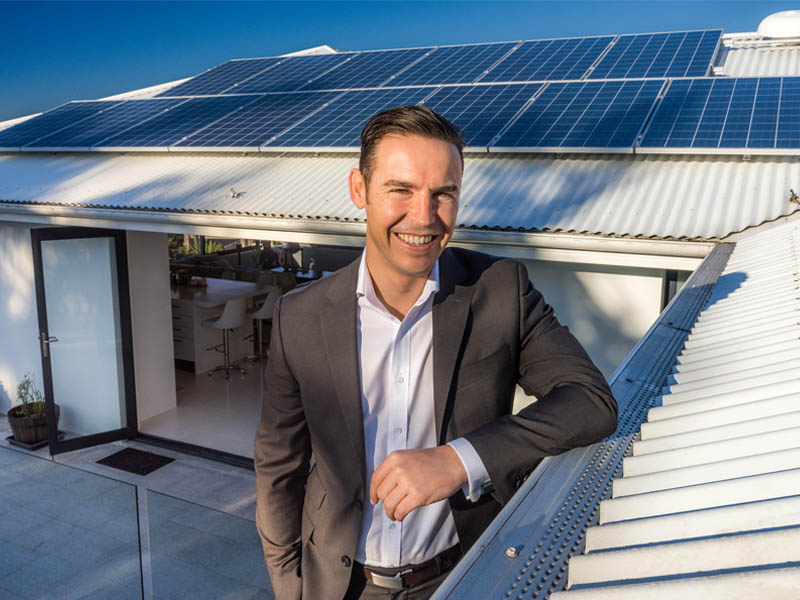The highly anticipated and controversial Finkel Report “falls short” for local clean energy startups and does them a disservice by skewing in favour of the big incumbents, local innovators say.
Chief Scientist Alan Finkel’s review of Australia’s energy market most significantly recommended a Clean Energy Target as the best way to meet Australia’s emission reduction targets.
But Evergen CEO Emlyn Keane said the review skews heavily in favour of large incumbents and doesn’t provide a strong enough emphasis on the opportunities provided by young tech firms in the space.

“Although the Finkel Review does talk to the appreciation that consumers are at the heart of the transition, we feel it has fallen a bit short in its recognition of the opportunities of decentralised generation and storage, not only in renewable energy targets but in lowering the cost of energy supply to the mums and dads of Australia,” Mr Keane told InnovationAus.com.
“The report has underappreciated the kind of impact that can happen very, very quickly with firms like ours getting on with the job. It leans very much to the big end of town.”
The review “under-appreciates” the role that solar and battery storage can play in Australia’s energy networks, Mr Keane said.
“There is a great opportunity to guarantee bill reductions. If you invest and support it you can absolutely guarantee bill savings, reduce risks of congestion in the grid and put a lot of employment into communities,” he said.
Piers Grove, founder of clean energy startup hub and accelerator EnergyLab, agreed that the report does favour the big players, but said it will still provide some much needed long-term stability for local startups operating in the space.
“It brings confidence for investment once we see this being implemented. Having certainty in the market encourages investment and a more long-term outlook,” Mr Grove said.
“Traditionally renewable energy and clean-tech companies have an eight to ten year value realisation, which is slower than tech companies. So that certainty in the regulatory environment and investment climate is vital to us,” Mr Grove told InnovationAus.com.
The report has also been criticised by the startup sector for not providing enough incentives for retailers to hand over consumer data on energy use.
The Finkel Report recommended that the ACCC compel electricity providers to make their pricing more transparent and comparable and that the COAG Energy Council should work to improve access to energy data by mid-2020.
Mr Keane said he had hoped the review would include recommendations to extend and increase government support for solar initiatives like the Small Scale Tech Certificates, which offers financial incentives for households or businesses to install solar power facilities.
“It would’ve been great to see that pushed on and continuing to give security to investors in businesses like clean energy startups. We feel as though there are certainly existing initiatives in small pockets that are expiring over time that could have been promoted,” he said.
The review should have also included recommendations for government to cut red-tape in the sector, helping startups to offer innovative new schemes, he said.
“As a business deploying these systems right now to customers we have to go through different processes in each state. As long as we have those discussions with customers, that doesn’t make a compelling investment case,” Mr Keane said.
“The review could have gone some way to clear this up and make it a consistent approach. You don’t necessarily have to throw money at it, it’s just about encouraging it and doing something about it.”
Mr Grove said that responsibility now lies with the government to foster innovation in the clean energy sector.
“The fact that it favours larger companies doesn’t actually overly concern because as the market transforms there will be opportunities emerging by the virtue of that.
“But separately there’s an opportunity for the government to specifically address innovation in the sector. I don’t think the Finkel Report has to do absolutely everything that needs to be done,” he said.
“There’s a difference between certainty of energy supply for Australia and how Australia taps into what is going to be a booming industry and make the most of it. We don’t need to put everything into one report.”
Mr Grove is calling on the federal government to also support the startups involved in the space, and to encourage entrepreneurs to get involved with the industry, for the good of the country.
“We need the federal government to acknowledge and support organisations like us that work with early-stage entrepreneurs and incentivise people to get in this industry, rather than getting into developing apps for iPhones – to get into the meatier work of developing clean-tech companies with a global perspective,” he said.
Australia is prime ground for innovations in clean energy stemming from startups, and a lot more needs to be done than just the Finkel Report to foster this, he said.
“There are few other markets on Earth that are as well suited for testing and deploying renewable energy innovations than Australia. We’ve got 1.6 million consumers who have already engaged in renewable energy by putting solar on their roofs. This means there’s a prime market for storage,” Mr Grove said.
“And our energy prices are exorbitantly high. That means that technologies are commercially viable in Australia potentially years ahead of other markets.”
Do you know more? Contact James Riley via Email.

